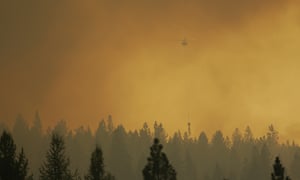Summer
2015 set to be world's hottest ever as US temperatures again soar
US
had its 12-hottest summer but seven of the warmer seasons were in
last 15 years. With ocean temperatures rising, scientists warn: ‘It’s
definitely not good’
12
September, 2015
New
data showing that the US had its 12th-hottest summer on record may
not, at first glance, appear particularly significant or alarming.
But
in announcing the news, climate scientists have pointed out that, of
the 11 American summers that were recorded as warmer than 2015’s,
seven have occurred in the last 15 years; the other four were all
during the “Dustbowl” 1930s heatwaves that plagued the US during
the Great Depression.
And,
as part of the climate warming trend globally, next Thursday a
federal agency is set to announce the latest worldwide figures that
are likely to show that it was officially the hottest summer ever
recorded on the planet, and the hottest first eight months of the
year to date.
The
summer of drought, fires and heat for large parts of the western US
dominated the news and pushed national temperatures up, even though
the central states were cooler than average for the season.
The
average temperature in the lower 48 states for June to August 2015
was 72.7F (22.6C), 1.3 degrees above the 20th-century average,
according to the latest data from the National Oceanic and
Atmospheric Administration (NOAA), where the records go back to 1895.
California,
Nevada, Oregon and Washington states have experienced their hottest
year on record and the north-east nudged record warm temperatures for
August.
On
1 September, 30% of the contiguous US was suffering drought
conditions, up 3.3% since July, according to a NOAA report released
on Friday.
Scientists
are watching with interest the combined effect of the El Niño
cyclical weather pattern warming the surface waters of the equatorial
region of the Pacific Ocean at the same time as the northern reaches
of that ocean have also been unusually warm this summer.
The
state of Alaska has experienced its warmest year recorded to date,
with temperatures four degrees fahrenheit (2.2 degrees celsius) above
average, the NOAA report said.
“We
do have a long-term warming trend for the globe and the US and it’s
manifesting itself in the lower 48 as more and more summers, and
years, and individual months being warmer than average and warmer
than they were in the past,” said Jake Crouch, a climate scientist
at NOAA.
Washington
state’s historic wildfires this summer have charred more than
300,000 acres, the largest burning on record for the state.
“It’s
becoming more common to see record or near record temperatures,”
said Crouch.
He
warned that the drought in California was expanding into the
north-west and another warm winter for the region would worsen the
drought.
El
Niño is expected to
bring huge storms to California but limited rain to Oregon and
Washington and NOAA does not expect any of it to be enough to offset
the serious effects of the severe long-term drought in the region.
On
Thursday, NOAA will release climate data for the globe for August.
“I’m
assuming that August is going to be another warm month for the
globe,” said Crouch, while declining to go into further detail or
confirm that it will officially cap the warmest summer and warmest
eight months on record worldwide.
However,
the data has been heading in that direction. NOAA had previously
predicted that there was “almost
no way” that
2015 would not prove to be the warmest on record globally.
On
Thursday it’s expected officially to be confirmed that the first
eight months have been the warmest on record so far and the warmest
three-month period June to August, constituting the hottest summer
ever logged for the northern hemisphere.
Crouch
pointed out that in the first seven months of 2015, worldwide figures
had shown that the globe was almost a degree warmer than average and
August figures are likely to have been boosted by the strengthening
El Niño pattern.
“It’s
extraordinary how much of the ocean is at record warm temperatures –
about 75% to 80% of the world’s oceans are at record or near record
warmth,” he said.
“I’m
at a loss for words. It’s definitely not good.”




No comments:
Post a Comment
Note: only a member of this blog may post a comment.